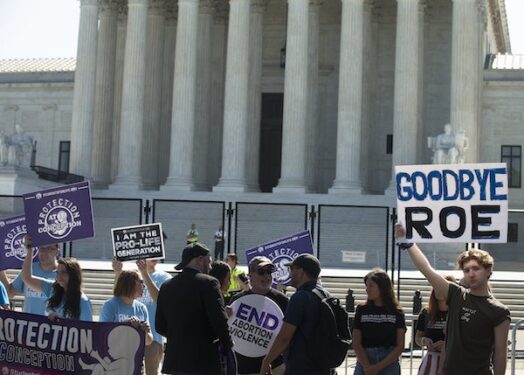
By Elise Ann Allen
ROME — After the U.S. Supreme Court’s historic decision Friday overruling Roe v. Wade, the Vatican’s top official on life issues has said the decision is an opportunity to both strengthen societal support for mothers and to launch a deeper reflection on human life.
Speaking to The Tablet about the decision, Italian Archbishop Vincenzo Paglia, president of the Pontifical Academy for Life, said, “The killing of an innocent human being can never be considered a ‘right.’”
“This goes for abortion, it goes for war, it goes for the death penalty, and for the selling and use of arms. Our society — as a whole, not just the West — must outlaw murder in all its forms,” he said.
As the debate on abortion choice now shifts to individual states, Archbishop Paglia said there is a need for a greater commitment “against every form of violence” within the pro-life movement.
“The sentence in the U.S. can be an occasion for a great debate in society, in politics, in culture, on the meaning and value of life,” he said, and pointed to the fact that birth rates are rapidly dropping throughout the West.
In light of this trend, Archbishop Paglia said the most fundamental topic to address today is the need “to give meaning to generating children, to give a future to our sons and daughters, leaving them a habitable planet and trust in life as an inheritance.”
Archbishop Paglia’s remarks came the day after the Supreme Court in a 6-3 vote overturned the landmark 1973 Roe v. Wade ruling that found a constitutional right for abortion rooted in a right to privacy.
The Supreme Court in its June 24 decision also overturned the 1992 Planned Parenthood v. Casey ruling which reinforced Roe v. Wade.
With abortion no longer being recognized as a constitutionally protected right, the debate over its legalization now falls to individual states.
Thirteen states have already codified the right to abortion throughout the entire pregnancy into state law, meaning yesterday’s ruling will have little effect on the legal right to an abortion within those jurisdictions.
However, 13 other states have so-called “trigger laws” that will either immediately or almost immediately go into effect now, banning abortion in those places. Five additional states have preexisting bans on abortion that will go back into effect.
Now that abortion legislation is back at the state level it will be up to individual bishops to handle the local fallout in their states in what is shaping up to be an increasingly divisive and contentious debate throughout the country.
In terms of advice for U.S. bishops who are now rolling up their sleeves and preparing for battle, Archbishop Paglia said it is not his place to give it, since each bishop is responsible for their own territory.
However, in terms of the broader social context, he stressed the need to provide “adequate sexual education, to guarantee health care that is accessible to all, and to prepare legislative measures to protect the family and motherhood, overcoming existing disparities.”
“We need solid assistance for mothers, couples, and the unborn child that involves the whole community,” and which encourages expectant mothers in difficulty “to continue their pregnancy and to entrust the child to those who can guarantee their growth,” he said.
This, Archbishop Paglia added, is a commitment every Catholic structure ought to make throughout the world, “in every diocese, in every nation.”
In a statement issued immediately after yesterday’s historic decision, the Pontifical Academy for Life urged citizens to overcome division and toss ideology aside, instead of joining forces to build a more just and equitable society capable of protecting life and caring for everyone, especially mothers.
The Pontifical Academy for Life joins the U.S. bishops’ statement on the decision of the Supreme Court of the United States. Archbishop Jose Gomez of Los Angeles, president of the conference, and Archbishop William Lori, head of the bishops’ pro-life committee, said that “the Court’s opinion shows how the issue of abortion continues to arouse heated debate.”
“The fact that a large country with a long democratic tradition has changed its position on this issue also challenges the whole world,” the pontifical academy said.
“The protection and defense of human life is not an issue that can remain confined to the exercise of individual rights but instead is a matter of broad social significance,” they said, stressing the need, nearly 50 years after Roe v. Wade first went into effect, “to reopen a non-ideological debate” on the place that protection of life issues have in civil society.
At the heart of the debate is the question of “developing political choices that promote conditions of existence in favor of life without falling into a priori ideological positions,” the academy said, saying this implies proper education and accessible health care, as well as legislative measures that protect families, and especially expectant mothers.
